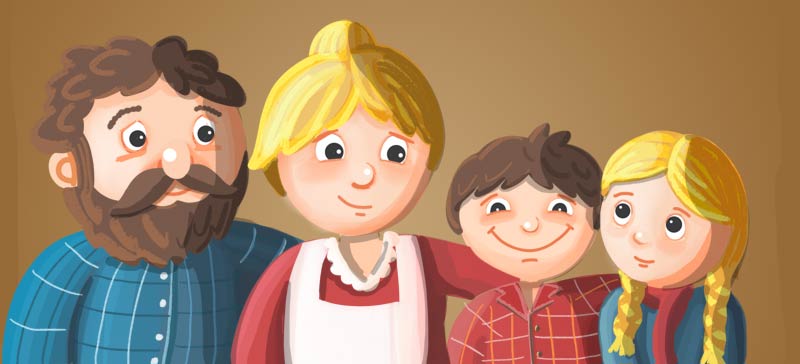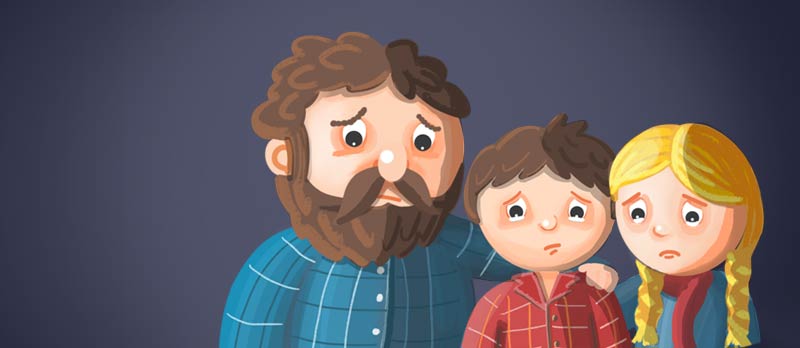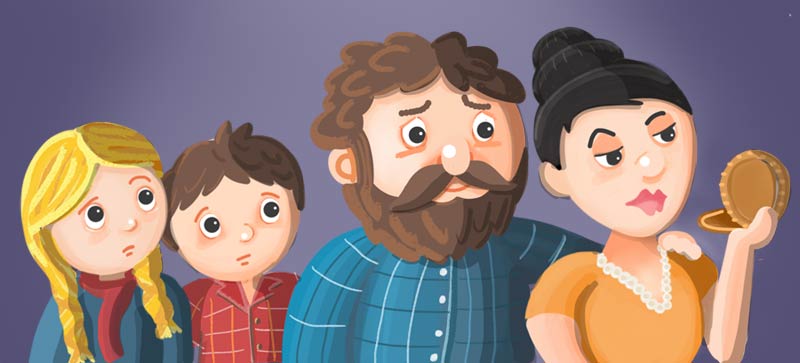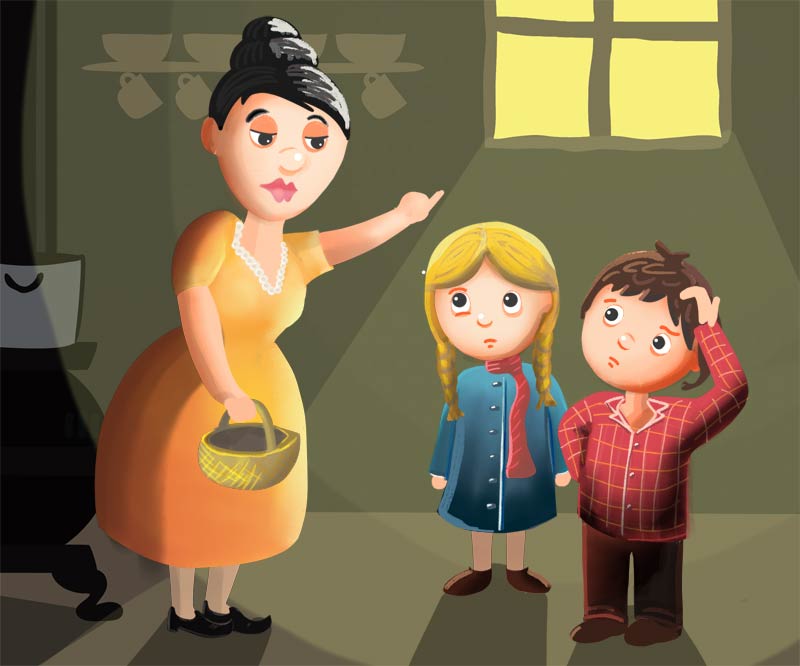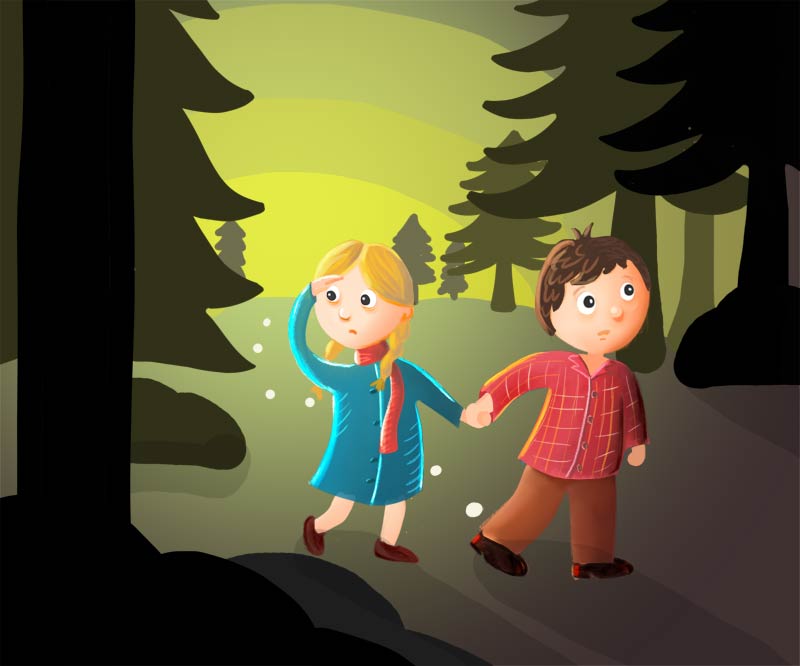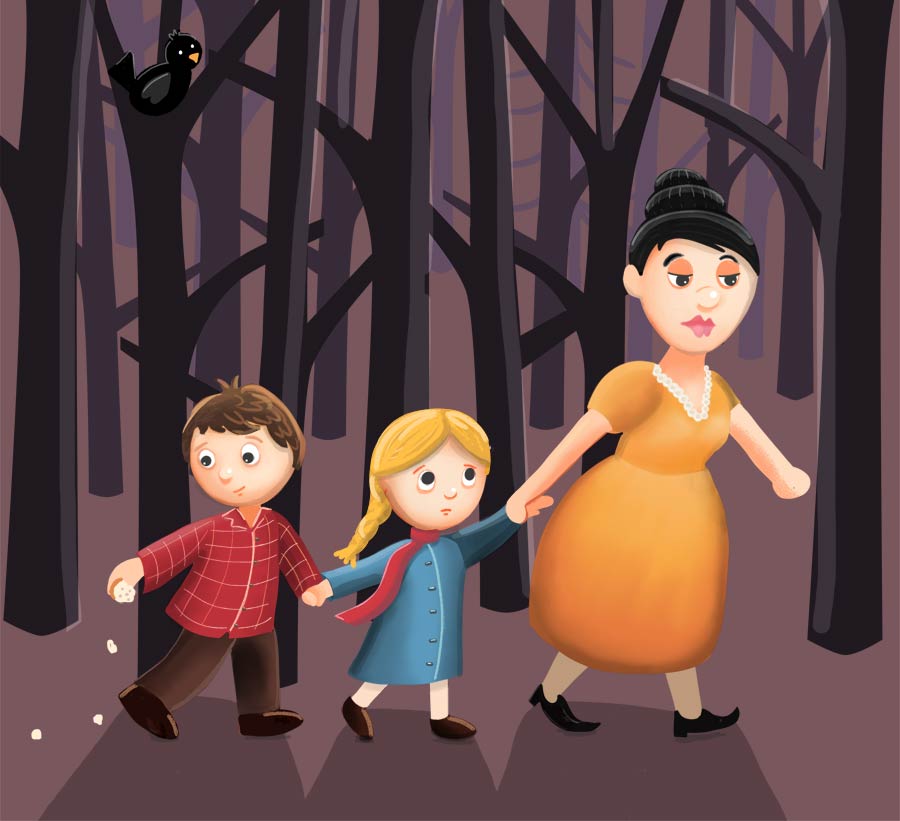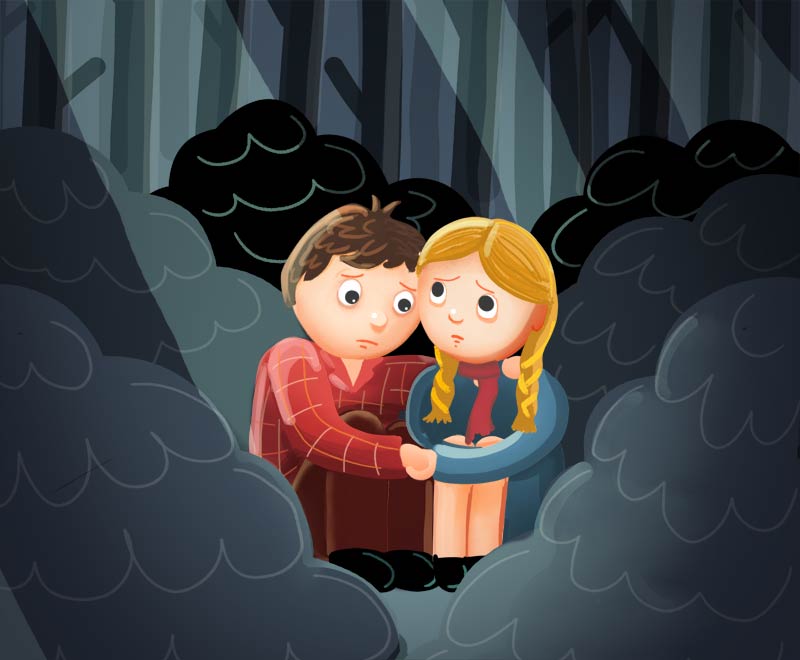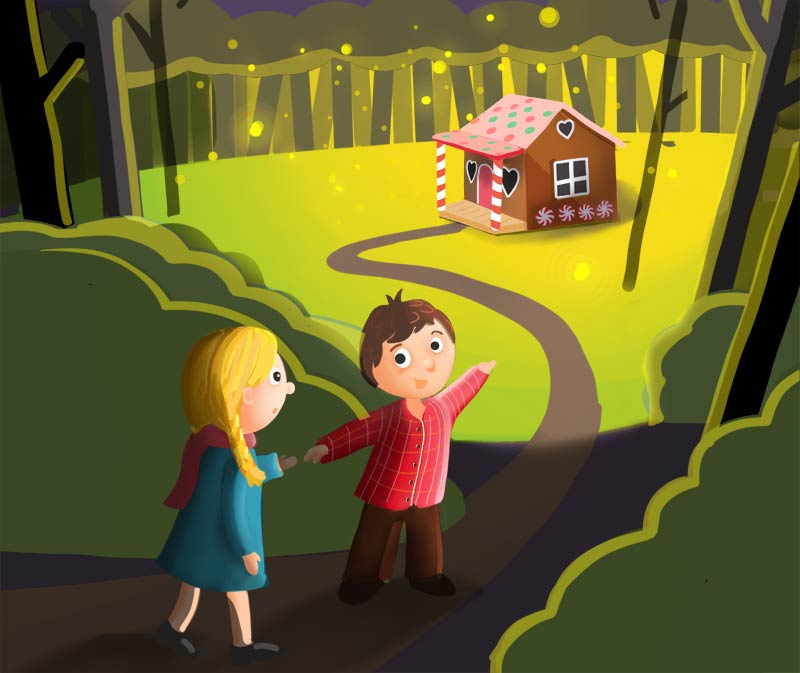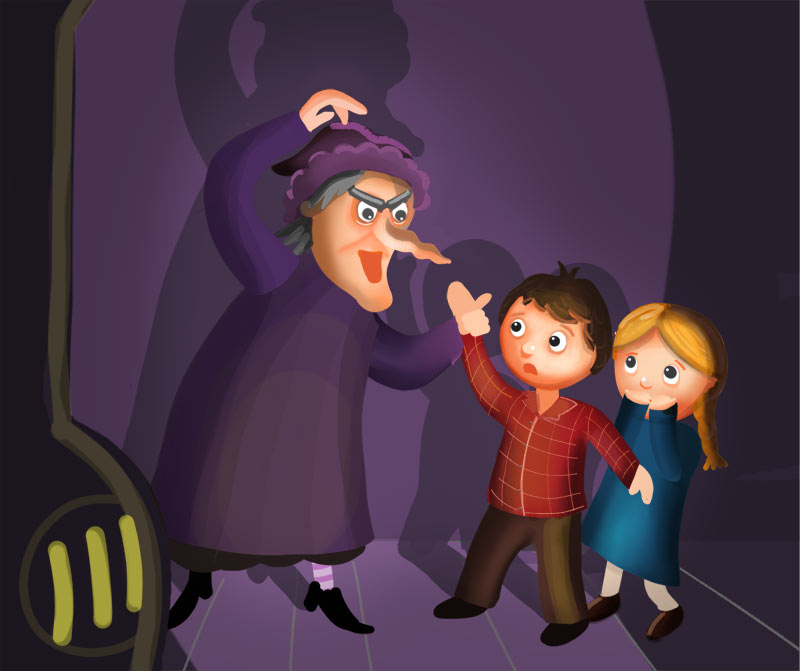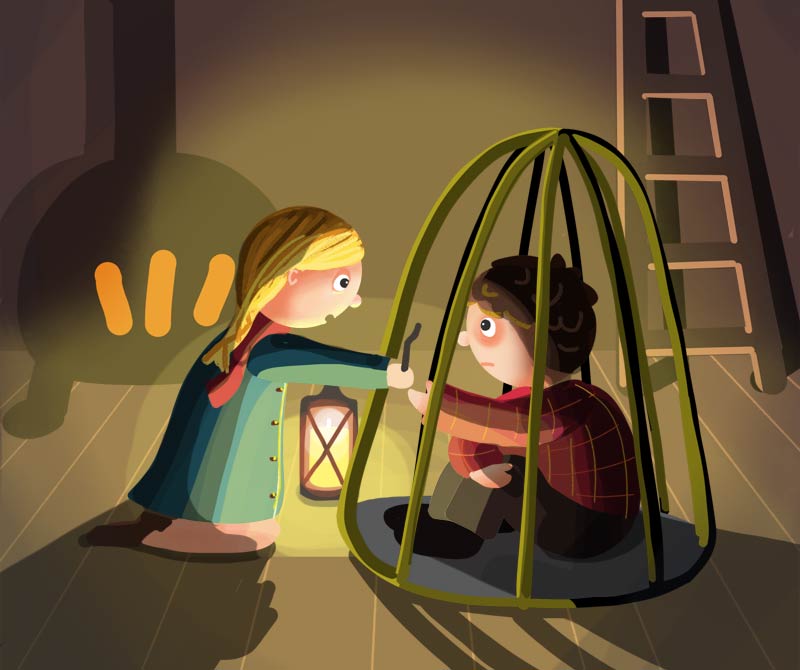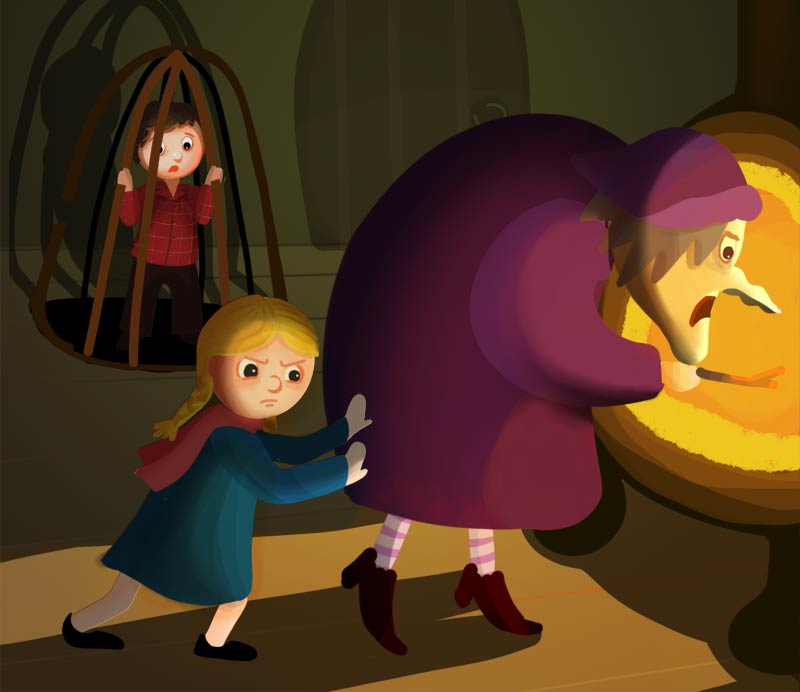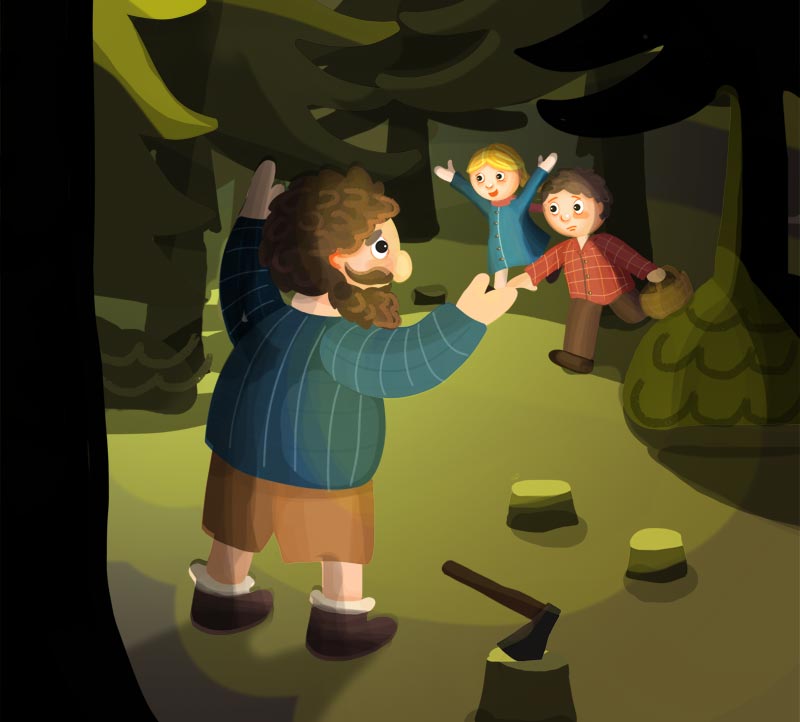Hace muchos años, hubo un leñador. Él vivía en lo profundo del bosque con su esposa. Ella era una mujer buena y amable. Tenían dos hijos: Hansel y Gretel.
Many years ago, there was a woodcutter. He lived deep in the forest (literally: in the deep of the forest) with his wife. She was a kind and gentle woman. They had two children: Hansel and Gretel.
La familia no tenía mucho dinero, pero su casa siempre estaba calientita y los niños siempre tenían sopa y pan para comer. Nunca pasaban hambre.
The family did not have much money, but their home was always nice and warm, and the children always had soup and bread. They never went hungry.
Un año, hubo un invierno terriblemente frío y la madre de Hansel y Gretel se enfermó y murió.
One year, there was a terribly cold winter, and Hansel and Gretel's mother became ill and died.
Con el tiempo, el leñador se casó con otra mujer, pero ella no era bondadosa ni amable. Era malvada y egoísta. Quería ser rica. Y quería comer alimentos caros como asado de res, puré de papas, arvejas, choclo, tortas de limón y frutas exóticas de soleadas tierras.
The woodcutter eventually married another woman, but she was not kind and gentle. She was cruel and selfish. She wanted to be rich. And she wanted to eat fancy foods like roast beef, mashed potatoes, peas, corn, lemon cakes, and exotic fruits from sunny lands.
Ella estaba enojada de que sólo se pudieran permitir comer sopa y pan para cada comida.
“¡Sopa y pan! ¡Sopa y pan! ¡Todos los días! ¡Sopa y pan! ¡Estoy cansada de la sopa y del pan!” se quejó ella.
She was angry that they could only afford soup and bread for every meal.
"Soup and bread! Soup and bread! Every day! Soup and bread! I am tired of soup and bread!" she complained.
La madrastra era muy malvada con Hansel y Gretel, porque creía que ellos eran la razón por la que la familia era tan pobre.
The stepmother was very cruel to Hansel and Gretel because she believed they were the reason the family was so poor.
“¡Ustedes, niños, comen demasiado! ¡Ustedes tienen la culpa de que sólo tengamos sopa y pan para comer!”
Ella quería que los niños desaparecieran.
"You children eat too much! It's your fault (literally: you have the blame) that we only have soup and bread!"
She wanted the children gone.
Un día, mientras el leñador estaba fuera cortando leña, la madrastra llamó a Hansel y a Gretel para que viniesen a la cocina de su cabaña.
One day, while the woodcutter was out cutting wood, the stepmother called Hansel and Gretel (to come) into the kitchen of their cottage.
“No hay suficiente comida para hacer sopa para la cena”, dijo la madrastra. “Todos pasaremos hambre esta noche. Vayan al bosque y recojan setas para hacer una sopa de setas. Yo sé dónde crecen las mejores setas…”
"There is not enough food to make soup for dinner”, said the stepmother. "We will all go hungry tonight. Go into the forest and pick mushrooms to make a mushroom soup. I know where the best mushrooms grow…"
Entonces, les dio las indicaciones más confusas que se le pudieran ocurrir. Ella sabía que ellos nunca serían capaces de encontrar el camino a casa.
Then she gave them the most confusing directions she could think of. She knew they would never be able to find their way home.
“Caminen hacia el norte por dos horas, giren a la izquierda en los árboles altos, caminen hacia el este por veinte minutos, continúen de frente, crucen el arroyo, giren a la derecha hacia la carretera principal...
"Walk (towards) north for two hours, turn left at the tall trees, walk (towards) east for twenty minutes, continue straight ahead, cross the stream, turn right onto the main road...
... pasen a través del agujero en la valla, caminen debajo del puente (estén atentos al trol), y luego, tres millas hacia dentro del bosque, encontrarán setas debajo de un árbol. Váyanse ahora para que puedan estar de vuelta a tiempo para la cena”.
... go through the hole in the fence, walk under the bridge (watch out for the troll), and then three miles inside the forest, you will find some mushrooms under a tree. Go now so you can be back in time for dinner."
Hansel y Gretel estaban asustados. Ellos sabían que el bosque era profundo y oscuro, y que era fácil perderse.
“¡No te preocupes! ¡Tengo un plan!” le susurró Hansel a Gretel. Él fue a la parte de detrás de la casa y se llenó los bolsillos con piedrecitas blancas del jardín.
Hansel and Gretel were scared. They knew the forest was deep and dark, and that it was easy to get lost.
"Don't worry! I have a plan!” whispered Hansel to Gretel. He went to the back of the house and filled his pockets with white pebbles (little stones) from the garden.
Luego, los dos niños empezaron a caminar, siguiendo las indicaciones de su madrastra. Cada pocos pasos, Hansel dejaba caer al suelo una piedrecita blanca.
Then the two children started walking, following their stepmother’s directions. Every few steps, Hansel dropped on the ground a white pebble.
Ellos caminaron durante horas, pero no encontraron ninguna seta.
“Es casi de noche. Estoy asustada”, dijo Gretel llorando.
“No te preocupes. ¡Yo puedo encontrar el camino a casa!” dijo Hansel.
They walked for hours, but they did not find any mushrooms.
"It’s almost night time. I’m scared," said Gretel, crying.
"Don't worry. I can find the way home!" said Hansel.
Hansel esperó hasta que la luna estuvo brillante. La luz de la luna se reflejaba a través de los árboles altos y hacía brillar sus diminutas piedrecitas blancas. Ellos siguieron el rastro de las piedrecitas todo el camino de vuelta a casa.
Hansel waited until the moon was bright. The moonlight (literally: light of the moon) reflected through the tall trees and made his tiny white pebbles glow. They followed the trail of pebbles all the way back home.
Su madrastra estaba furiosa. Ella no esperaba que los niños hallasen el camino a casa. “¡Tontitos! ¿Dónde están las setas?” gritó la madrastra.
“¡Ahora no tenemos nada que comer! ¡No cenarán esta noche! ¡Váyanse directamente a la cama!”
Los niños se fueron a la cama con hambre.
Their stepmother was furious. She didn't expect the children to find their way home. "Little fools! Where are the mushrooms?" the stepmother shouted.
"Now we have nothing to eat! You will not be eating dinner tonight! Go straight to bed!”
The children went to bed hungry.
A la mañana siguiente, después de que el leñador se fuera al trabajo, la madrastra despertó a los niños.
The next morning, after the woodcutter left for work, the stepmother woke the children up.
“¡Despierten! ¡Despierten tontitos! Hoy es el cumpleaños de su padre. Quiero hacerle una tarta de manzana para su cena de cumpleaños. Vayan al bosque y recojan algunas manzanas. Esta vez iré yo también. Yo sé dónde podemos encontrar un manzano grande”.
“Wake up! Wake up you little fools! Today is your father’s birthday. I want to make him an apple pie for his birthday dinner. Go into the forest and pick some apples. This time I will come too. I know where we can find a big apple tree.”
Ella les dio una hogaza de pan para su almuerzo y luego, les apuró a salir de la casa. Hansel no tuvo tiempo de recoger piedrecitas.
She gave them a loaf of bread for their lunch, and then she hurried them (to go) out the house. Hansel did not have time to collect any pebbles.
Pero el inteligente Hansel tenía un plan. Él no se comió su pan para el almuerzo. En vez de eso, lo partió en pequeñas migajas. Cada pocos pasos, él dejaba caer una migaja para marcar el sendero.
But clever Hansel had a plan. He did not eat his bread for lunch. Instead, he tore it into tiny crumbs. Every few steps, he dropped a crumb to mark the path.
Ellos siguieron a su madrastra por el camino, doblando una esquina y a través del bosque. “¡Más allá! ¡Más allá!” dijo la madrastra.
Ellos se adentraron en el bosque. Giraron a la izquierda. Giraron a la derecha. “¡Más allá! ¡Más allá!” dijo la madrastra.
They followed their stepmother down the path, around a corner, and through the forest. "Further! Further!" said the stepmother.
They went deeper into the forest. They turned left. They turned right. "Further! Further!" said the stepmother.
Finalmente, se detuvieron, y la madrastra se sentó a descansar. Ella señaló a una parte muy oscura del bosque. “¡El manzano está por allá!”
Finally they stopped, and the stepmother sat down to rest. She pointed to a very dark part of the forest. "The apple tree is over there!"
Los niños se adentraron más en el bosque, pero no vieron el manzano.
“¿Dónde?” gritaron ellos.
“¡Sólo un poco más allá!” gritó la madrastra.
The children walked deeper into the forest, but they didn't see the apple tree.
"Where?" they called.
"Just a little further!" called the stepmother.
Hansel y Gretel se adentraron cada vez más profundo en el bosque, pero aún no veían el manzano.
“¿Dónde?” gritaron ellos por segunda vez.
“¡Tan sólo un poco más allá!” respondió la madrastra. Su voz se oía muy débil ahora.
Hansel and Gretel walked deeper and deeper into the forest, but they still didn't see the apple tree.
"Where?" they called a second time.
"Just a little further!" replied the stepmother. Her voice was very faint now.
Hansel y Gretel caminaron y caminaron, más y más profundo. Ningún manzano.
“¿Dónde?” gritaron por tercera vez.
Pero no hubo respuesta de su madrastra. Ella se había ido.
Hansel and Gretel walked and walked, deeper and deeper. No apple tree.
"Where?" they called a third time.
But there was no reply from their stepmother. She had gone.
“¡Oh, no! ¡Estamos perdidos!” dijo Gretel llorando.
“No te preocupes, tengo un plan” dijo Hansel.
Él se dio la vuelta para hallar las migajas, ¡pero habían desaparecido!
¡Los hambrientos pájaros se habían robado todos los pedazos de pan!
“Oh no! We are lost!” said Gretel, crying.
“Don’t worry, I have a plan,” said Hansel.
He turned around to find the crumbs, but they were gone! The hungry birds had stolen every piece of bread!
“Estoy asustada”, dijo Gretel llorando. “¡Y tengo frío y hambre y quiero irme a casa!”
“No te preocupes. Todo va a estar bien”, dijo Hansel tratando de hacerse el valiente. Pero él estaba asustado también.
"I'm scared," wept Gretel. "And I'm cold, and hungry, and I want to go home!"
"Don't worry. Everything will be alright,” Hansel said, trying to be brave. But he was scared, too.
Aquella noche, los niños durmieron en unos matorrales blandos para mantenerse calientes.
That night, the children slept in some soft bushes to stay warm.
Cuando despertaron, el sol estaba brillando, los pájaros estaban cantando, y había un olor dulce y delicioso en el aire.
“Tengo mucha hambre”, dijo Gretel. “Creo que huelo a galletas...”
“¡Mira!” dijo Hansel, señalando. “¡Una casa!”
When they woke up, the sun was shining, the birds were singing, and there was a sweet, delicious smell in the air.
"I am so hungry," said Gretel. "I think I smell cookies…."
"Look!" said Hansel, pointing. "A house!"
Era la casa más extraña que ellos habían visto alguna vez. Las paredes parecían galletas de limón amarillo. Las ventanas parecía que las habían hecho de chocolate. El tejado parecía que lo habían hecho de caramelos verdes y rojos.
It was the strangest house they had ever seen. The walls looked like yellow lemon cookies. The windows looked like they were made of chocolate. The roof looked like it was made of green and red candies.
Hansel se estaba muriendo de hambre. Así que corrió hacia la casa y rompió un pedazo de pared. “¡Esto sabe a galleta de limón!” dijo sorprendido.
Hansel was starving. So he ran to the house and broke off a piece of the wall. "This tastes like a lemon cookie!" he said, surprised.
Gretel agarró un pedazo de una ventana y se lo metió en la boca. “¡Esto es chocolate!”
Los niños no podían dejar de comer.
“Nos quedaremos aquí para siempre”, declaró Hansel, masticando el porche de tarta de manzana.
Gretel grabbed a piece of a window and stuffed it in her mouth. "This is chocolate!"
The children could not stop eating.
"We'll stay here forever," Hansel declared, munching on the apple pie porch.
Ellos estaban a punto de probar un pedazo de la puerta de caramelo morado cuando se abrió de golpe silenciosamente.
They were just about to try a piece of the purple candy door when it quietly swung open.
“¡Hola!” dijo una anciana desde detrás de la puerta. “¿A ustedes les gustan los dulces? ¡Tengo más dentro de la casa! ¡Entren! ¡Entren! ¡No tengan miedo!”
"Hello!" said an old woman from behind the door. "Do you children like sweets? I have more inside the house! Come in! Come in! Don’t be afraid!"
La anciana parecía bondadosa y amistosa, así que los dos niños entraron.
¡Oh, no! ¡Mala idea! La anciana no era bondadosa y amistosa en absoluto. ¡Ella era una bruja mala!
The old woman looked kind and friendly, so the two children went inside.
Oh no! Bad idea! The old woman was not kind and friendly at all. She was an evil witch!
Tan pronto estuvieron dentro Hansel y Gretel, ella cerró de golpe la puerta y le echó llave. Los niños estaban atrapados.
As soon as Hansel and Gretel were inside, she slammed the door and locked it. The children were trapped.
La bruja agarró a Hansel por la muñeca. “¡Tú estás demasiado delgado!” dijo ella. “¡Debo engordarte antes de comerte!” Entonces, ella arrojó a Hansel a una jaula y le cerró la puerta con llave.
The witch grabbed Hansel by his wrist. "You're too thin!" she said. "I must fatten you up before I eat you!" Then she threw Hansel into a cage and locked the door.
Ella se volteó hacia Gretel. “Niña tonta. Tú harás las tareas domésticas, ¡luego te comeré a ti también!”
She turned to Gretel. "Foolish girl. You will do the household chores, then I'll eat you too!"
Hansel empezó a llorar. “¡Por favor, no me coma!” suplicó él. Pero Gretel permaneció calmada.
“No te preocupes. ¡Ahora yo tengo un plan!”, susurró Gretel
Hansel began to cry. “Please don’t eat me!” he begged. But Gretel stayed calm.
“Don’t worry. Now I have a plan!” whispered Gretel.
Entonces Gretel se fue a hurtadillas a donde estaba su hermano y le dio una ramita.
“Mañana por la mañana, la bruja verá si estás lo bastante gordo para comerte. Cuando ella venga, dale esta ramita en lugar de tu dedo”, le ordenó
Then Gretel snuck over to her brother, and she gave him a twig.
“Tomorrow morning, the witch will see if you are fat enough to eat. When she comes, give her this twig instead of your finger,” she ordered.
Efectivamente, por la mañana, la bruja se fue cojeando hacia Hansel y gruñó: “Saca tu dedo a través de la jaula. ¡Quiero ver si estás lo bastante gordo para comerte!”
Sure enough, in the morning, the witch hobbled over to Hansel and growled, “Stick your finger through the cage. I want to see if you are fat enough to eat!”
Hansel extendió la ramita.
“¡Aún estás demasiado delgado!”, se quejó ella. “Ven aquí, niña tonta, y dale a tu hermano más dulces para que coma”.
Hansel held out the twig.
"You're still too thin!" she complained. “Come here, foolish girl, and give your brother more sweets to eat.”
Esto continuó por una semana entera. Cada día, la bruja comprobaba para ver si Hansel estaba lo bastante gordo. Cada día Hansel extendía la ramita.
This continued for an entire week. Every day, the witch checked to see if Hansel was fat enough. Every day, Hansel held out the twig.
Finalmente, la bruja se cansó de esperar. El octavo día, ella llamó a Gretel: “¡Ven acá, niña tonta! Enciende el horno. Hoy voy a comer niño asado con zanahorias y salsa de carne. ¡Comprueba que el horno está lo bastante caliente para asar a tu hermano!”
Finally, the witch got tired of waiting. On the eighth day, she called to Gretel: "Come here, foolish girl! Light the oven. Today I am going to eat roasted boy with carrots and gravy! Check if the oven is hot enough to roast your brother."
Pero la inteligente y pequeña Gretel tenía otro plan. Ella empezó a llorar. “Pero soy demasiado estúpida. ¿Cómo sé si el horno está lo bastante caliente? ¿Me puede mostrar?”, preguntó ella.
But clever little Gretel had another plan. She started to cry. "But I am too stupid. How do I know if the oven is hot enough? Can you show me?" she asked.
La bruja murmuró y refunfuñó: “¡Niña inútil! Comprobaré el horno yo misma”.
The witch muttered and grumbled: "Useless child! I'll check the oven myself."
La bruja se inclinó para mirar las llamas de color naranja brillante, y rápidamente, Gretel la empujó dentro del horno y cerró la puerta de un golpe. ¡POM!
Ese fue el fin de la bruja.
The witch bent down to look at the bright orange flames, and quickly Gretel pushed her into the oven and slammed the door shut. THUD!
That was the end of the witch.
Gretel abrió la jaula de Hansel. Los niños hallaron una cesta y la llenaron con tortas y galletas, pasteles y caramelos. Luego, se fueron corriendo tan rápido como pudieron.
Gretel unlocked Hansel’s cage. The children found a basket and filled it with cakes and cookies, pies, and candies. Then they ran away as fast as they could.
Ellos corrieron toda la noche. Corrieron a través del bosque. Corrieron por debajo del puente. Se deslizaron a través de un agujero en la valla. Voltearon a la izquierda. Voltearon a la derecha. Izquierda. Derecha. Izquierda. Derecha. Finalmente, oyeron el sonido de alguien cortando madera a la distancia.
They ran all night. They ran through the forest. They ran under the bridge. They crawled through the hole in the fence. They turned left. They turned right. Left. Right. Left. Right. Eventually they heard the sound of someone cutting wood in the distance.
¡Era el leñador! Los niños corrieron hacia su padre y le abrazaron y le besaron. Él lloraba y lloraba. Pero en realidad él estaba muy feliz.
“¡Mis dulces, dulces niños! ¿Dónde estaban?”
It was the woodcutter! The children ran to their father and hugged him and kissed him. He cried and cried. But he was actually very happy.
"My sweet, sweet children! Where were you?"
Hansel y Gretel contaron al leñador la historia completa. Cuando él oyó que su madrastra les había abandonado en el bosque, estaba furioso. Él ordenó a la madrastra que abandonara la casa inmediatamente y que no regresara nunca.
Hansel and Gretel told the woodcutter the whole story. When he heard that their stepmother had abandoned them in the forest, he was furious. He ordered the stepmother to leave the house immediately and never return.
Esa noche, Hansel y Gretel y su padre tuvieron una fiesta de cumpleaños retrasada. Comieron todos los dulces de la cesta: tarta de cereza, pastel de chocolate, caramelos verdes y rojos, chupetines azules y galletas de jengibre.
That night, Hansel and Gretel and their father had a late birthday party. They ate all the sweets from the basket: cherry pie, chocolate cake, green and red candies, blue lollipops, and gingerbread cookies.
Más tarde ese año, Hansel y Gretel estaban visitando la panadería del pueblo cuando vieron a una anciana pidiendo monedas. ¡Era su madrastra!
“¡Niños! ¡Por favor, ayúdenme! ¡Me muero de hambre!”, suplicó ella.
Later that year, Hansel and Gretel were visiting the bakery in town when they saw an old woman begging for coins. It was their stepmother!
“Children! Please help me! I am starving!” she begged.
Gretel pensó por un momento. Ella entró en la panadería y compró una pequeña hogaza de pan y un pequeño tazón de sopa.
“Aquí tiene”, dijo Gretel. “Sopa y pan. Su comida favorita.”
Hansel y Gretel no volvieron a ver a su madrastra nunca más.
Gretel thought for a moment. She went inside the bakery and bought a small loaf of bread and a small bowl of soup.
“Here,” Gretel said. “Soup and bread. Your favorite.”
Hansel and Gretel never saw their stepmother ever again.

Download this audio
Need help? How to download audio to your device


